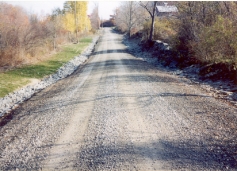 Twenty-eight thousand miles of unpaved roads provide local service to Pennsylvania’s rural residents and the major enterprises of agriculture, tourism, mining/mineral industries, and forest products. Although they are inexpensive to maintain, loss of fine materials from the roads and their drainage areas creates dust and sediment. If not properly maintained, these roads can become sources of runoff and pollution to neighboring streams and waterways. Runoff in our waterways depletes the oxygen levels, smothering aquatic life that supports our fisheries. Dirt roads that are not properly maintained become large providers of dust and sediment.
Twenty-eight thousand miles of unpaved roads provide local service to Pennsylvania’s rural residents and the major enterprises of agriculture, tourism, mining/mineral industries, and forest products. Although they are inexpensive to maintain, loss of fine materials from the roads and their drainage areas creates dust and sediment. If not properly maintained, these roads can become sources of runoff and pollution to neighboring streams and waterways. Runoff in our waterways depletes the oxygen levels, smothering aquatic life that supports our fisheries. Dirt roads that are not properly maintained become large providers of dust and sediment.
On April 17, 1997 the PA General Assembly approved House Bill 67 as amended, the Transportation Revenue Bill. This bill was signed into law as Act 3 of 1997. Included in this law is $5 million annually earmarked for Dirt and Gravel Roads Maintenance. $4 million goes directly to the State Conservation Commission while the remaining $1 million goes to the Department of Conservation and Natural Resources for maintenance on state forestry roads.
The program came into being in response to concerns voiced by members of Pennsylvania Trout (a council of “Trout Unlimited”) over problems cause by sediment pollution from unpaved roads in the state’s premier trout streams. Subsequent follow-up efforts included creation of a Task Force on Dirt & Gravel Roads that was a cooperative working group consisting of state department personnel, sportsmen, environmental resource agency officials, local government representatives, private companies, Penn State researchers, legislative staff, and citizen environmental group members. Both Pennsylvania Trout and the Task Force recommended a locally based, locally controlled, cooperative approach to eliminate non-point source pollution occurring along these rural roadways.
In January 2001, the Center for Dirt & Gravel Road Studies was established at Penn State University. The Center works closely with the State Conservation Commission, Conservation Districts, Quality Assurance Boards, and local municipalities to research improved maintenance techniques, provide “hands-on” technical assistance & training, appropriate maintenance practices and products, and broaden the impact of this pollution prevention effort.
The State Conservation Commission apportions Dirt & Gravel Road Maintenance funds to the County Conservation Districts. A Quality Assurance Board (QAB) has been created in Lackawanna County by the County Conservation District to establish and administer the grant program. The QAB is responsible to encourage local cooperation with environmental quality goals, to provide adequate opportunity for public input, and to ensure participation amongst a wide spectrum of environmental expertise at all levels of government.
The four-member QAB is comprised of:
- A non-voting chairman appointed by the Lackawanna Conservation District Directors
- One local representative appointed by each of the following entities:
- The USDA Natural Resources Conservation Service (federal)
- The Pennsylvania Fish and Boat Commission (state)
- The Lackawanna Conservation District (local)
Eligibility
Local municipalities and state agencies that maintain dirt and gravel roads are eligible to receive funding. However, to be eligible for the program, the participant must first attend a two-day training session for “Environmentally Sensitive Maintenance of Dirt and Gravel Roads”. To request funding, applicants submit a one-page application to the local Quality Assurance Board (QAB). The QAB, in turn, reviews the applications. To ensure equal access to the funds, the QAB establishes local priorities to prevent pollution. To be eligible, projects must employ “environmentally sound” maintenance practices and products to correct pollution problems related to the roadway.
Funding
Once a grant has been awarded, the project participant is generally given 50% of the grant amount to begin the project. 50% of the grant moneys are held by the Conservation District and QAB until the QAB and/or Conservation District staff has conducted a final inspection of the project. Once the project is completed and the QAB and Conservation District has determined that the project was completed in an environmentally sound way and according the program guidelines, the remainder of the money is then awarded to the project participant.
Quick Contact
Kimberly Nagle-570-382-3086 x.104


